Massive Merger Alert: Omnicom and Interpublic Set to Reshape Advertising Landscape!
In a groundbreaking development that could fundamentally transform the global advertising industry, Omnicom Group and Interpublic Group (IPG) are reportedly in advanced merger discussions that promise to create an unprecedented powerhouse in marketing communications.
The potential merger, first revealed by the Wall Street Journal, represents a seismic shift in the advertising world. Sources close to the negotiations suggest the deal could value Interpublic at approximately $13 billion to $14 billion, excluding debt, marking one of the most significant corporate consolidations in recent advertising history.
The Strategic Landscape
Analysts are viewing this potential merger through multiple lenses. The combined entity would instantly become the largest advertising agency globally, with a projected net revenue exceeding $20 billion. This strategic move appears designed to:
- Consolidate market resources
- Enhance competitive positioning
- Create unprecedented scale in client services
- Streamline operational efficiencies
“This isn’t just a merger; it’s a potential industry revolution,” said marketing expert Rachel Zimmerman. “We’re witnessing a fundamental restructuring of how global advertising will operate.”
Key Players and Their Profiles
Omnicom, headquartered in New York, has long been recognized as one of the world’s most integrated advertising and communications firms. With a client base spanning over 5,000 global organizations, the company has consistently demonstrated remarkable market adaptability.
Interpublic, meanwhile, brings its own substantial portfolio, currently valued at around $10.9 billion. The company’s diverse client base across healthcare, retail, and technology sectors makes it an attractive merger partner.
Potential Challenges and Considerations
Despite the exciting prospects, the merger is not without significant challenges:
- Regulatory Hurdles: Antitrust considerations could complicate the merger
- Client Conflict Management: Overlapping client relationships must be carefully navigated
- Cultural Integration: Merging two large corporate cultures presents substantial organizational challenges
Financial and Performance Context
Recent financial performances provide interesting context. Omnicom reported a robust 6.5% organic growth year-over-year, while Interpublic has been strategically positioning itself through selective digital agency divestments.
The merger could potentially trigger a broader consolidation wave in the advertising industry, with major players like WPP potentially reassessing their strategic positioning.
Market and Industry Implications
“This merger represents more than just corporate consolidation,” noted industry veteran Michael Chen. “It’s a response to rapidly evolving digital marketing landscapes and increasing client demands for integrated, comprehensive solutions.”
The potential deal would surpass the failed Publicis-Omnicom merger attempt in 2014, signaling a more mature and strategically aligned approach to industry consolidation.
Timing and Expectations
While an official announcement could come as soon as this week, experts caution that complex negotiations and regulatory reviews might extend the process significantly. The intricate nature of such a massive merger demands meticulous planning and execution.
The Broader Context
This merger reflects broader trends in the advertising and marketing communications sector:
– Increasing digital transformation
– Need for comprehensive, integrated solutions
– Pressure to deliver more sophisticated, data-driven marketing strategies
Conclusion
The potential Omnicom-Interpublic merger represents a landmark moment in advertising history. While challenges remain, the strategic rationale appears compelling, promising a new era of consolidated, technologically advanced marketing services.
Stay tuned for further developments in this unfolding corporate narrative.
Disclaimer: This article is based on current reports and expert analysis. Actual merger details may vary as negotiations progress.






Leave a Comment